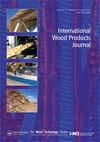本期报道
IF 0.9
Q2 MATERIALS SCIENCE, PAPER & WOOD
引用次数: 0
摘要
木材和木材保护专业的学生很难想象木材的结构,更不用说防腐剂是如何分布的了。LM对景深有严重的限制,其他方法可能涉及耗时的准备。不列颠哥伦比亚大学的Phil Evans在这篇论文中展示了微CT扫描产生的虚拟现实如何帮助克服这些局限性。本文章由计算机程序翻译,如有差异,请以英文原文为准。
In This Issue
It is difficult for students of wood and wood protection to visualise the structure of wood, let alone how preservatives might be distributed. LM has severe limitations on depth of field and other methods can involve time consuming preparation. In this paper, Phil Evans at the University of British Columbia, shows how virtual reality derived frommicro CT scans can help oversome these limitations.
求助全文
通过发布文献求助,成功后即可免费获取论文全文。
去求助
来源期刊

International Wood Products Journal
MATERIALS SCIENCE, PAPER & WOOD-
CiteScore
2.40
自引率
0.00%
发文量
27
 求助内容:
求助内容: 应助结果提醒方式:
应助结果提醒方式:


